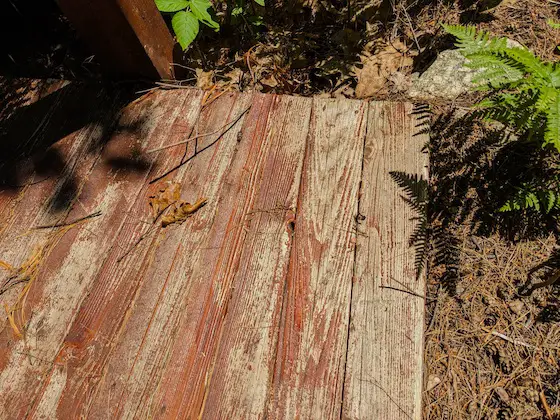Penetrating Deck Sealer

Best Penetrating Deck Sealer | Just three years ago this cedar decking looked like an exquisite piece of fine furniture. It had just been sealed with a top-quality outdoor sealer. Look at how it’s peeled. Copyright 2023 Tim Carter
Where is the Best Penetrating Deck Sealer?
Do you have a wood deck? How much time do you invest in cleaning and sealing it? How many gallons, currently priced around $55.00 per gallon, of high-quality sealer do you use to make your deck look fantastic? I pretty much know all the answers because I’ve dealt with cleaning and sealing outdoor decks. fences, and other wood for decades.
Deep experience is often coupled with cynicism. I’m acutely susceptible to this because it’s my job to think analytically about building products and tools. I feel a deep responsibility to find the best products and then share that information with you. When it comes to deck and outdoor wood sealers, I’m not certain there is a great product currently on the market.
In the three decades I’ve penned this column I’ve written about all sorts of products telling all the truths that the manufacturers conveniently leave out. I’ve been a master plumber since 1981 and when I saw the big push about the wonders of tankless water heaters I shared that in certain cases you’d never save money with them. Your energy bills would go up because you’d have an endless supply of hot water. I shared that you have to amortize the much higher installation cost. This meant it would take years to break even.
If my claims were wrong, I would have heard instantly from the water heater manufacturers. They would have demanded a retraction or correction column. I never heard a word. The exact same thing happened less than ten years ago when I exposed how asphalt shingles were being pre-aged. This means they don’t last as long as they should on your roof. Did the shingle manufacturers reach out crying foul about all the facts in my Roofing Ripoff book? The answer is no. That means my claims were correct.
Now let’s see what the deck sealer manufacturers are going to say. Less than thirty years ago deck sealers used to be true stains. They would soak into the wood and not leave a film on the surface. I distinctly remember testing one that use synthetic resin instead of natural oils. Natural oils like tung, linseed, and others are delicious food for mildew and algae. Not so synthetic resins.
That magic sealer penetrated into the wood and would look great for about three years. All you had to do to reseal the deck was to wash it with soap and water or an oxygen bleach solution. You’d then apply a fresh coat. The product never peeled. Back all those years ago many deck sealers were true penetrating stains.
But things started to change in the last two decades. Just about every deck sealer I’ve tested has peeled. In other words, the sealers are more like paint and varnish rather than like a wood stain that soaks into the wood.
The issue is when the film-forming deck sealer fails, it’s a catastrophic failure. Some of the sealer peels and some doesn’t. If you just clean the deck and reseal it not removing the unpeeled sealer and taking the deck to bare wood, you often get an uneven finish that appears blotchy.
To achieve great results when it’s time to reseal your outdoor wood, you have to strip off the old finish or sand it off. That is mind-numbing work, to put it mildly. This fact begs the question: Why would the manufacturers create film-forming products that cause you and millions of others so much agony? Is it to sell more sealer faster?
Realize that when I start to ask penetrating questions about product failures of any type, I often get the silent treatment from the public relations (PR) people who work for the manufacturers. Having done expert witness work for nearly thirty years I believe I know why. The attorneys working for the manufacturers don’t want information out in the public domain that might hurt the manufacturer in a future private or class-action lawsuit. This just happened to me when I started asking tough questions about lithium-ion batteries. No PR person would return my calls or emails.
You and I both have to battle unethical or misleading information on product labels. The most recent deck sealer I used, Cabot Australian Timber Oil, showed great promise when I applied it three years ago to my new cedar dock panels. The label said it was a penetrating finish. I thought for sure it would be like the sealer of old that was truly a penetrating stain.
It turns out it was a film former. Technically I’m sure an expert on the witness stand would or could say that some of the product did penetrate into the top layer of wood fibers. But I feel half-truths are whole lies. The manufacturer of the product I bought could have also added a phrase, “…and once dry a protective surface film stops water from entering the wood.”
Had that description been on the label, I would have instinctively known it was a film former destined to peel. All of the wood leading to my boat dock I treated with this product is looking horrible and if I want it to look fantastic, it’s going to be a huge project to get rid of the old inferior product.
What are your options? Well, you can bite the bullet if you intend to live in your home for many years. You can get a top-quality composite deck material that requires just a simple cleaning each spring to get off any dirt from winter storms. I did that with all my decks and now I’m contemplating doing it with my boat dock. Wish me luck!
Column 1515

16 Responses to Penetrating Deck Sealer